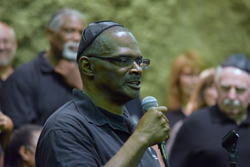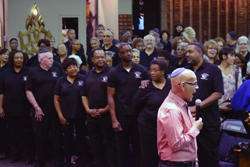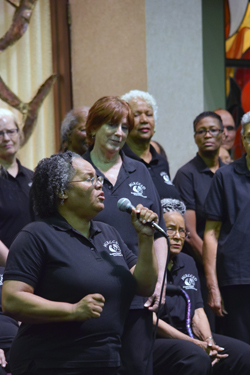By Donald H. Harrison


SAN DIEGO — It was a double first Saturday night at Tifereth Israel Synagogue. It was the first time that the Conservative Jewish congregation had ever hosted a gospel choir. And, it was the first time that the Martin Luther King Jr. Community Choir San Diego had ever performed in a synagogue — anywhere.
MLKCCSD, as the choir is known, had performed at Carnegie Hall in New York City, and at the Vatican during a European tour, but never before in a Jewish house of worship, according to choir director Ken Anderson.
“When we said to the choir that we’re going to perform at a synagogue everyone said ‘Really! This is amazing to be invited to a synagogue,’ said Anderson, who also is a music instructor at Grossmont College in neighboring El Cajon. “This is amazing, to wear a yarmulke and to know that it stays on, no matter how I shake my head– It’s perfect.”
His reaction to the performance which included eight songs, three of them solos?
“It’s kind of a bit of coming home, because it starts with the God of Israel — of Abraham, Isaac and Jacob,” Anderson said. “When I came here to view the place, I got to see one of the handwritten Torahs and to know that they are still doing that, the old tradition by hand, character after character, line after line. It is kind of like stepping into the Bible, the Old Testament. And it is amazing being here, this place of worship…”
 The evening started with a Havdalah service led by Rabbi Leonard Rosenthal, who officially retires at the end of June. The congregation sang the traditional Havdalah songs with a little extra gusto, but they were no match for the power of the nearly 100-strong gospel choir whose soloists included Billie Collins, Dale Fleming and Anderson himself.
The evening started with a Havdalah service led by Rabbi Leonard Rosenthal, who officially retires at the end of June. The congregation sang the traditional Havdalah songs with a little extra gusto, but they were no match for the power of the nearly 100-strong gospel choir whose soloists included Billie Collins, Dale Fleming and Anderson himself.
Collins sang “Total Praise;” Fleming “Oh Freedom,” and Anderson, substituting for regular soloist Arnessa Rickett, who was ill, “”I Will Bless the Lord at All Times.”

Other selections included a pair of Negro spirituals, “Glory, Glory Hallelujah,” and “Every Time I Feel the Spirit,” as well as “Every Praise is to Our God,” and one in which the Jewish congregation rose to its feet to join in, “This Little Light of Mine.”
Introducing gospel to the Jewish audience, Anderson said: “When we clap our hands we clap for the Lord… Maybe you’ve seen people clapping their hands and shouting ‘Hallelujah’ on TV and you always wanted to try that.” The congregation laughed. “Just wave your hands and pray,” Anderson continued, “and shout “Hallelujah, Glory, Praise the Lord, and Amen.” The congregation followed his instructions, however tentatively.
The play list was especially tailored for the Jewish congregation — the praise in the songs was for God, with no mention made of Jesus or other figures in Christian Scriptures.
Stressing the connection between Judaism and Gospel, Anderson related that “the spirituals themselves were songs that we used in the Southern states — God is so amazing — that a man can communicate his love even in a wicked time. The slaves began to take stories from the Bible and formed code songs. They especially were drawn to the story of the Children of Israel, their bondage in Egypt, and Moses’ leadership to take them to the Promised Land because that was the situation that they found themselves in…
“They understood that the churches in the South were abusing the Bible in words to justify slavery; so they gravitated towards God and away from their owners. When she sang, she was away from her brothers and sisters — so that’s why she sang ‘He’s got my brothers and my sisters in his hands, He’s got the whole world in his hands.’
“And when a baby was born, the baby was taken from her to another plantation, and that is why she sang, ‘He’s got my little bitty baby, in His hands, He’s got the whole world in his hands.’
“It was important for her to understand that in spite of the evil that she was in the midst of, God was in control and one day he was going to end this, and so they came up with songs that said things like, ‘Lord help me to hold out …’
“When they sang about going to heaven and the Promised Land, it was a code name for freedom, and when they sang about Moses, or Joshua, or any leader in the Bible, it was a code name for Harriet Tubman and other abolitionists like her.”
 The congregation listened to the spirituals and the gospel music with mounting enthusiasm — giving standing ovations for the solos, most especially for Fleming’s rendition of “Oh Freedom,” in which she sang ever and ever higher. In this song, the recurring vow is “Before I’ll be a Slave, I’ll be Buried in My Grave.”
The congregation listened to the spirituals and the gospel music with mounting enthusiasm — giving standing ovations for the solos, most especially for Fleming’s rendition of “Oh Freedom,” in which she sang ever and ever higher. In this song, the recurring vow is “Before I’ll be a Slave, I’ll be Buried in My Grave.”
How did the Jewish congregation react? Before Fleming completed her emotional rendition of “Oh Freedom,” many were dabbing tears from their eyes.
Typical of Jewish functions, there was a reception in the social hall following the program — where the choir and congregation broke bread together.
*
Harrison is editor of San Diego Jewish World. He may be contacted via donald.harrison@sdjewishworld.com
I have been a member of synagogues for 57 years. Reform. Conservative. Orthodox. Chabad. And never have I heard a gospel choir perform in shul. This was indeed a historic event. Thank you so much, Don Harrision, for capturing the evening for your readers.